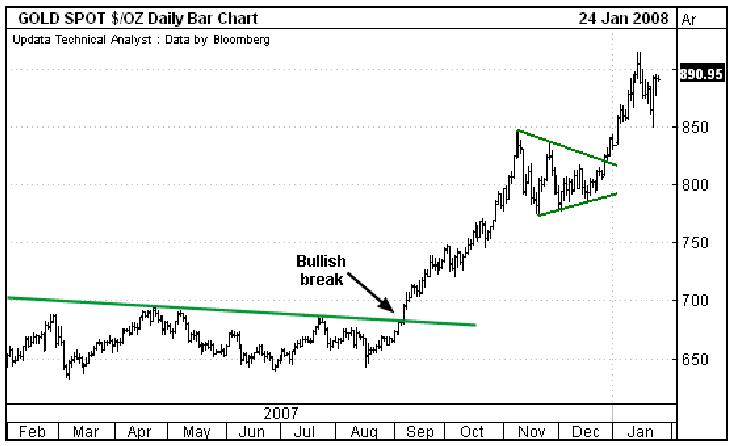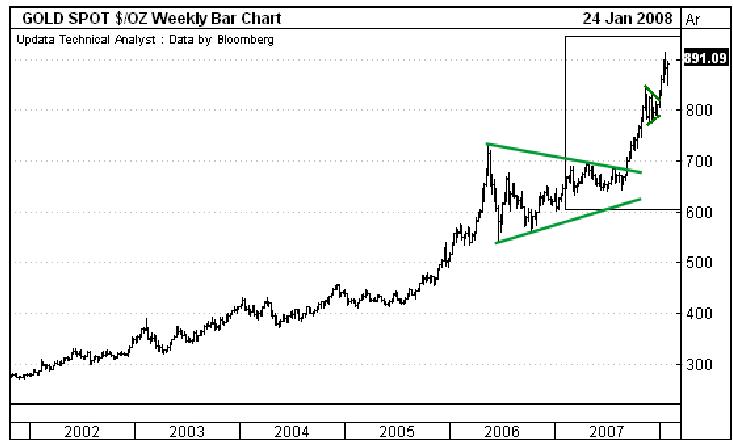How To Invest During Economic Downturns: Commodities versus Stocks
Commodities / Learning to Invest Jan 28, 2008 - 02:54 PM GMTBy: Mary_Rivas
 In an article published yesterday (January 23, 2008) in the Financial Times , George Soros stated that a recession in the U.S. is now more or less inevitable. He noted that China , India and some of the oil-producing countries however are in a very strong countertrend. Soros went on to explain that “the current financial crisis is less likely to cause a global recession than a radical realignment of the global economy, with a relative decline of the U.S. and the rise of China and other countries in the developing world. “
In an article published yesterday (January 23, 2008) in the Financial Times , George Soros stated that a recession in the U.S. is now more or less inevitable. He noted that China , India and some of the oil-producing countries however are in a very strong countertrend. Soros went on to explain that “the current financial crisis is less likely to cause a global recession than a radical realignment of the global economy, with a relative decline of the U.S. and the rise of China and other countries in the developing world. “
A growing number of economists, money managers and analysts have begun issuing warnings that a recession may be hard to avoid in 2008. On top of that, recent data is indicating an increase in inflation that is being fueled by higher prices for commodities such as oil, wheat and corn.
Given the growing concerns of the future of the economy, I thought it would be very helpful to provide readers with some history on how commodities and stocks have performed over various economic cycles.
Performance of Commodities vs. Stocks
To understand how commodities and stocks perform during economic downturns, let's look at past trends.
In a revolutionary study from the Yale School of Management's Center for International Finance entitled Facts and Fantasies About Commodity Futures, research revealed very important differences in how commodities and stocks perform over time. The research team analyzed how commodity investments performed compared to stocks and bonds over the last half century .
Below are some key highlights of the research findings over various investment horizons:
• Stocks and bonds are negatively correlated with inflation . In other words, as inflation increases, stocks and bonds tend to move in the opposite direction. Commodities futures, in contrast, are positively correlated with inflation. When inflation rises, commodity futures tend to rise as well.
• Commodity prices can rise even during economic downturns. Commodities can serve as a hedge against stock market and economic risk.
• Commodities and stocks have a negative correlation . In other words, commodities and stock perform tend to perform oppositely over time. When stocks go down, commodities, over time, tend to move up and vice versa. Thus, a portfolio invested in stocks and commodities, is likely to experience less volatility than a portfolio that is comprised of only stocks.
• From 1959 to 2004, commodities futures produced comparable annual returns to stocks and greatly outperformed bonds.
• Commodities have had less risk than stocks over time. The volatility (i.e., fluctuations in portfolio returns) of the returns of commodities futures over a 43-year period was less than the volatility of the S&P 500 index over the same period.
While no one can be certain if the looming recession will be global or more or less confined to the developed world, one thing is clear: ignoring commodities in a declining stock market is irrational.
Every investor can benefit by learning how to diversify beyond stocks and bonds. A properly diversified portfolio that includes commodities can enhance return and reduce risk. To learn more, visit www.powerpathtomoney.com .
In a recent interview with Bloomberg ( January 7, 2008 ), Jim Rogers , known by many as the world's expert on commodities investing, reaffirmed his positive outlook on commodities. He stated that ``All commodities are going to be in much shorter supply for another decade.'' Rogers indicated that in the event of a global recession, agricultural commodities may be the best investment among commodities.
The findings of the Yale study and others have triggered huge changes in the financial industry---many which affect you. Investment companies are increasingly creating new investment vehicles to enable individual investors to participate in commodity investing. Today there are easily accessible ways for you to invest in commodities and to find which investment vehicle is right for you. Anyone can now invest in commodities in low-cost and easy ways that were not available during the last commodity bull market.
By Mary Rivas
Mary Rivas has over 16 years of experience working in the investment management industry, and is the author of Power Path To Money, which is available at www.powerpathtomoney.com . She wrote this book to teach people 1) how to use low cost ways to easily invest in commodities and 2) how to invest in themselves to achieve maximum success. Her book reflects her philosophy that successful investing is achieved by being knowledgeable about investment opportunities and by developing one's inner power.
Mary Rivas Archive |
Buy Gold on Correction Towards $850
"..the most secure form of gold ownership is to actually take physical possession of the gold."
Unless you've decided not to read our reports after taking out a subscription, Members will be well aware of our constant recommendations to buy gold and or gold stocks. Buying gold stocks is relatively easy. Where there seems to be some confusion is in how to buy bullion.
The first point to note is that we are recommending buying physical gold, not a paper derivative or gold futures or anything else where it relies on a counterparty providing delivery of that gold.
Obviously the most secure form of gold ownership is to actually take physical possession of the gold. By this, we don't mean taking it home and shoving it under the bed. Unless you have a safe, it is best to pay for a safety deposit box at a major bank to store the gold for you securely. This way the gold is in your possession - not held by someone else on your behalf.
Physical possession can be arranged in a number of ways, most conveniently through a local bullion or coin dealer. Just on coins, unless you know what you're buying or have a trusted relationship with a coin dealer, we suggest avoiding investing in gold through coins.
One way of buying bullion relatively easily is through the London Stock Exchange via Lyxor Gold Bullion Securities, trading under the ticker, GBS. This is similar to an ETF (exchange traded fund) whereby the amount invested is backed by physical gold. In this case, the gold is stored in vaults in London. More information can be found in the link below.http://www.lyxorgbs.com/
While there are different ways to own gold, it all boils down to one thing; owning real money that is not backed by a third party promise to pay at some future date.

Supporting our view of a shorter term correction, in recent week's gold has become increasingly talked about in the mainstream media and it seems US$1,000 price targets are all the rage in 2008. Although this does not diminish our longer term bullish view (it's actually a long term positive as more investors learn about gold's investment qualities) we are concerned that gold's new found popularity might lead to short term disappointment amongst the latecomers.

We recommend continuing to hold gold and for those without exposure or looking to add to their position, look to buy on any correction towards the US$850 region.
For more information on Fat Prophets go to www.fatprophets.co.uk or call 08003890705.
About Us - Fat Prophets provides independent advice on the financial markets where our objective is to be transparent, accountable, objective and ethical. We believe that integrity is the central characteristic of every successful investor. Our independence in financial markets is derived from the fact that Fat Prophets does not execute transactions or provide investment banking services.
Fat Prophets principal focus is to deliver a quality service to Members by
discovering and identifying quality stock recommendations on the London
Stock Exchange.
The launch of our UK service follows the successful establishment of Fat
Prophets in Australasia.
Founded in June 2000, Fat Prophets is owned and operated by financial
markets professionals. Having become Australia's leading independent stock
market advisors, our horizons were broadened during 2003 through the
addition of Fat Prophets United Kingdom. Our service offering also includes
Fat Prophets Mining & Resources, Fat Prophets USA, and Fat Prophets Funds
Management.
Fat Prophets UK was launched in 2003. As one of the world's largest stock
markets, the UK offers an expansive array of investment opportunities.
Within this environment our value-based strategy has proven highly
successful, and fattened our Members' portfolios.
Fat Prophets Australasia focuses on delivering a quality service to Members
by identifying and recommending undervalued companies on the Australian and
New Zealand stock exchanges.
Fat Prophets Mining & Resources coverage extends to companies involved in
mining, exploration, precious metals, diversified resources, energy, mineral
sands, bulk ores, diamonds, as well as mining and energy infrastructure
services.
Fat Prophets USA has an international focus, recommending a broad range of
US based and foreign companies trading on the US exchanges.
Fat Prophets Funds Management
In 2005 the company diversified into funds management when the Fat Prophets
Australia Share Fund (Fat Fund) was successfully listed on the Australian
Stock Exchange after $33 million was raised.
Disclaimer :
Mint Financial (UK) Ltd, trading as Fat Prophets United Kingdom, has made
every effort to ensure the reliability of the views and recommendations
expressed in this report. Fat Prophets United Kingdom research is based upon
information known to us or which was obtained from sources which we believed
to be reliable and accurate at time of publication. However, like the
markets, we are not perfect.
This report is prepared for general information only, and as such, the
specific needs, investment objectives or financial situation of any
particular user have not been taken into consideration. Individuals should
therefore discuss, with their financial planner or advisor, the merits of
each recommendation for their own specific circumstances and realise that
not all investments will be appropriate for all subscribers.
To the extent permitted by law, Fat Prophets United Kingdom and its
employees, agents and authorised representatives exclude all liability for
any loss or damage (including indirect, special or consequential loss or
damage) arising from the use of, or reliance on, any information within the
report whether or not caused by any negligent act or omission. If the law
prohibits the exclusion of such liability, Fat Prophets United Kingdom
hereby limits its liability, to the extent permitted by law, to the resupply
of the said information or the cost of the said resupply.
Mary Rivas Archive |
© 2005-2022 http://www.MarketOracle.co.uk - The Market Oracle is a FREE Daily Financial Markets Analysis & Forecasting online publication.


